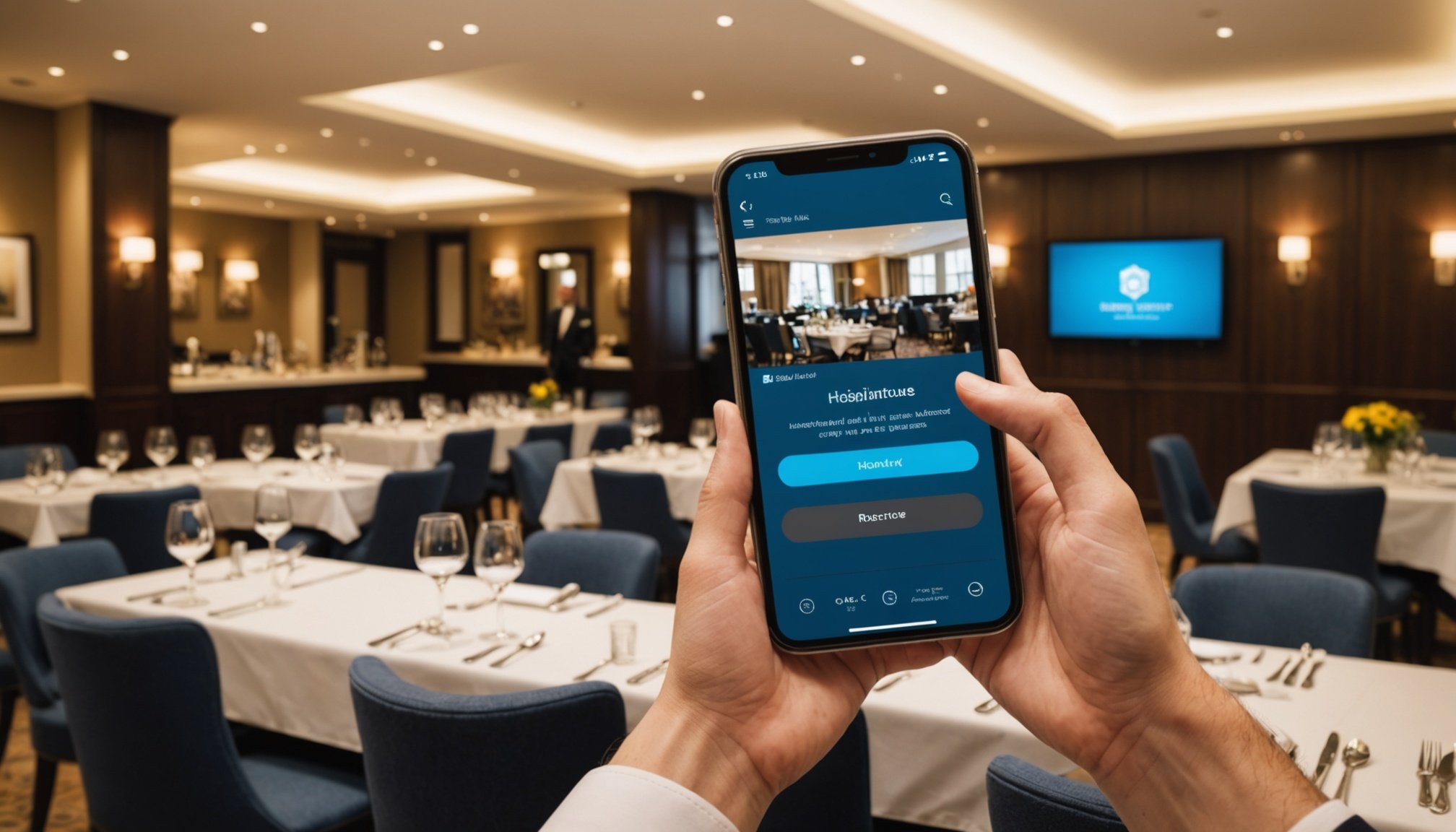Overview of Smart Technologies in UK Hospitality
Smart technologies are revolutionizing the UK hospitality sector. These innovations are transforming guest experiences and boosting operational efficiency across various services.
Smart technologies include tools and systems that utilize data, connectivity, and automation to elevate service levels. A significant trend in the industry is the focus on personalizing the guest experience. For example, many UK hotels are adopting smart room systems that allow guests to customize their environment through connected devices. This not only enhances comfort but also promotes an interactive stay tailored to individual preferences.
Also to discover : Securing Investment: Cutting-Edge Strategies for UK Healthcare Startups to Captivate Investors
From an operational efficiency standpoint, technologies like predictive maintenance and automated check-in processes drastically reduce human error and streamline operations. This results in faster service delivery and heightened satisfaction.
The current pursuit in the UK hospitality field is integrating these smart technologies seamlessly with traditional hospitality elements. This integration enhances overall service quality and maintains a balance between innovative features and the warmth of human interaction. By embracing these technological advancements, UK hotels aim to meet evolving guest expectations and ensure a competitive edge in a fast-paced industry.
Also to read : Connecting Rural UK: Cutting-Edge Telehealth Solutions Empowering Healthcare Providers
Internet of Things (IoT) Applications
In the UK hospitality sector, the Internet of Things (IoT) is reshaping service delivery and management. IoT involves the use of connected devices, which enables more efficient hospitality management and greater guest personalization.
Smart Rooms and Personalized Experiences
Smart rooms represent a significant advancement, allowing guests to control their environment with connected devices. Features such as automated lighting, climate control, and smart TVs create a tailor-made experience. This personalization extends to room service and entertainment options, all seamlessly integrated to enhance guest personalization.
IoT-Driven Operational Management
On the operational side, IoT applications like energy management systems and maintenance alerts play a crucial role. These tools monitor system performance, issuing real-time alerts for proactive maintenance. The result is optimized energy use, reduced costs, and prevention of unexpected breakdowns. By reliably managing resources, IoT boosts operational efficiency, supporting the industry’s goal of delivering top-notch service.
Understanding and leveraging IoT can significantly enrich the guest experience while driving operational excellence. Such innovations are essential for maintaining a competitive edge in a dynamic hospitality management landscape.
Artificial Intelligence (AI) Integration
AI is revolutionising guest interaction and operational efficiency in the UK hospitality industry. Through sophisticated data analytics, hotels gain insights into guest preferences, enabling personalised service offerings. By understanding what their clientele truly values, hotels can enhance guest experiences significantly.
Chatbots and Virtual Assistants
Chatbots and virtual assistants are at the forefront of AI utilization, providing support and information to guests around the clock. When guests have queries or require assistance, these intelligent systems deliver timely responses, enhancing efficiency and convenience. Their ability to handle frequent, repetitive tasks allows human staff to focus on more complex issues, thus improving overall service quality.
AI in Revenue Management
In revenue management, AI analyses vast amounts of data to identify patterns and trends, leading to better pricing strategies and occupancy forecasts. This sharp focus on data analytics allows hotels to adjust their offerings in line with demand fluctuations, maximising revenue potential. By continuously learning and adapting, AI supports superior decision-making, ensuring that operational practices align closely with both business goals and evolving guest needs. The fusion of AI with hospitality not only boosts efficiency but also fortifies the foundation for sustainable growth.
Contactless Services
In the dynamic UK hospitality industry, contactless services have emerged as essential, particularly for enhancing guest safety and convenience. One notable implementation is the introduction of mobile check-in/out services in hotels. Guests can now seamlessly manage their stay via their smartphones, significantly reducing wait times and physical interaction at the front desk.
This shift towards digital check-in is not just about convenience; it represents a commitment to guest safety. By minimizing contact, hotels mitigate the spread of infections, which has become critical in recent times. Alongside check-in services, contactless payment systems are gaining ground. These systems allow guests to settle bills effortlessly using NFC-enabled devices, enhancing the overall experience.
Successful integrations of these services can be seen in numerous case studies. For instance, several UK hotels report increased guest satisfaction due to streamlined processes and reduced queues. The adoption of contactless technology not only improves operational dynamics but also sets new standards in hospitality service excellence. With these advancements, hotels align closely with modern guest expectations, fostering loyalty and ensuring a competitive advantage.
Case Studies of Successful Implementations
In the realm of UK hospitality, numerous hotels stand out for their adept use of smart technologies, dramatically enhancing operational success. By adopting innovative solutions, these hotels have effectively improved both business operations and guest satisfaction.
Prominent UK hotels, such as The Savoy and the Hilton, are leveraging technologies like IoT and AI to optimize service delivery. These implementations lead to increased efficiency by automating routine tasks, thus allowing staff to focus on personalized guest interaction. This not only boosts operational excellence but also enriches the guest experience.
The business outcomes have been noteworthy. Hotels report higher occupancy rates and increased revenue, thanks to predictive analytics that fine-tune pricing strategies based on real-time data. Enhanced service levels also foster loyalty and repeat visits, offering a competitive edge in a crowded market.
Lessons learned from these case studies reveal the importance of maintaining a balance between technological advances and human interaction. Smart technologies should complement traditional hospitality values, ensuring warmth and personal touch remain integral to service. Such insights guide industry professionals in refining their approaches and fortifying their commitment to excellence in service delivery.
Future Trends in Smart Hospitality
With the rapid evolution of hospitality technology, understanding future trends is crucial for industry stakeholders. Anticipating emerging innovations is essential, as guest expectations continuously adapt to new possibilities.
One significant trend involves integrating artificial intelligence and Internet of Things (IoT) for hyper-personalised services. These technologies are expected to deepen, providing guests with more intuitive and tailored experiences. From AI-enabled decision-making to IoT-driven automation, the sky’s the limit for transformative guest interactions.
In addition, voice-activated technology is on the rise, simplifying guest interactions with in-room devices and service options. This hands-free convenience responds directly to demands for enhanced accessibility and efficiency.
Moreover, immersive technologies such as augmented reality (AR) woven into the guest journey promise enriched experiences. Whether through virtual showrooms or interactive travel guides, AR could redefine engagement.
As the industry embraces these emerging innovations, striving to meet evolving guest expectations is vital. Hoteliers must remain agile, overcoming potential challenges such as data privacy concerns and technical integration issues. By focusing on adaptability and forward-thinking strategies, hospitality providers can maintain their competitive edge while satisfying the modern guest’s desire for seamless and cutting-edge experiences.
Conclusion
As we contemplate the future of the UK hospitality sector, it’s clear that smart technologies will continue to play a pivotal role. By seamlessly integrating these advanced systems, businesses can significantly uplift the guest experience while ensuring operational efficiency. Prioritizing sustainability and strategic alignment is vital, as these factors will dictate the industry’s trajectory.
Key to success is the continuous enhancement of technology integration within operations. This involves embracing practices that not only meet but exceed guest expectations, fostering loyalty and maintaining a competitive edge. Well-balanced innovations provide benefits such as energy conservation, precise data-led decisions, and superior guest personalization.
To remain at the forefront, hospitality providers must be agile, ready to adapt to new technologies and implement forward-thinking strategies. Ensuring that these implementations are not only effective but also sustainable is crucial. Smart technologies serve as catalysts for this transformation, shaping an innovative and future-ready landscape.







